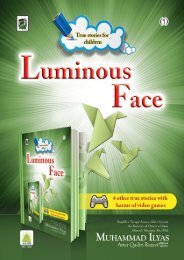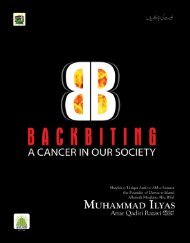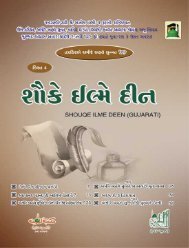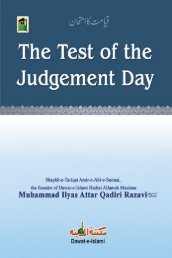Causes of Deprivation and its Solution - Dawat-e-Islami
Causes of Deprivation and its Solution - Dawat-e-Islami
Causes of Deprivation and its Solution - Dawat-e-Islami
You also want an ePaper? Increase the reach of your titles
YUMPU automatically turns print PDFs into web optimized ePapers that Google loves.
َۡۡۡ<strong>Causes</strong> <strong>of</strong> <strong>Deprivation</strong> <strong>and</strong> <strong>its</strong> <strong>Solution</strong>difficulties. Some are in debt, some have domestic problems,some are destitute while others are unemployed, some desirechildren whilst others are distressed by their own disobedientchildren. Briefly, we are all confronted with some kind <strong>of</strong>problem, <strong>and</strong> deprivation is at the top <strong>of</strong> the list. Hardly anyhome is free from this predicament. The main cause <strong>of</strong> thisproblem is our own inaction <strong>and</strong> bad deeds, as described inSūraĥ Ash-Shūrā like this: ۡ ۡ ۡ ۤ ۡۡ ۡ ۡ ۡ ۡ ۡ And whatever misfortune befalls you is due to what your ownh<strong>and</strong>s have earned; <strong>and</strong> He pardons much.[Kanz-ul-Īmān (Translation <strong>of</strong> Quran)] (Part 25, Sūraĥ Ash-Shūrā, verse 30)Therefore, we all should repent <strong>of</strong> our misdeeds <strong>and</strong> busy ourselveswith virtuous acts. Allah has said in Sūraĥ Al-A’rāf: ۡ ۡ ۡ ٰ ۡ Surely, the mercy <strong>of</strong> Allah is close to the good-doers.[Kanz-ul-Īmān (Translation <strong>of</strong> Quran)] (Part 8, Sūraĥ Al-A’rāf, verse 56)َّدُ َمَ ٰ حمَا ٰتَعَ َ احلُّۡو ۡ ا صَ لبِيبص َ يلَّ اّٰ ُ2
<strong>Causes</strong> <strong>of</strong> <strong>Deprivation</strong> <strong>and</strong> <strong>its</strong> <strong>Solution</strong>simple house, both are equally careless in this regard. A variety<strong>of</strong> food is wasted on several occasions especially weddings.Furthermore, we are all aware <strong>of</strong> the wastage <strong>of</strong> the leftovergravy, rice etc. while the pots are being washed. If only we hadkept an eye on this great cause <strong>of</strong> deprivation.’The mother <strong>of</strong> believers, ‘Āishaĥ Ṣiddīqaĥ hassaid, ‘The Noble Prophet ٖ entered his blessedhome <strong>and</strong> saw a piece <strong>of</strong> bread that was lying [on the ground].He ٖ picked it up, cleaned it <strong>and</strong> then ate it. He ٖ then said, ‘O ‘Āishaĥ ( )! Honour thegood thing as this thing (i.e. bread) does not return if it has runaway from any nation.’ (Sunan Ibn Mājaĥ Kitāb Al-Aṭ’imaĥ, vol. 4,pp. 49, Ḥadīš 3353, Dār-ul-Ma’rifaĥ, Beirut)Swearing in trade removes blessingsThese days, many shopkeepers use Ta’wīżāt <strong>and</strong> white magic,<strong>and</strong> make Du’ā to get rid <strong>of</strong> the effects <strong>of</strong> black magic or evilspells from their business, but they do not pay any heed tocarelessness in their trade, the main cause <strong>of</strong> the removal <strong>of</strong>blessings from their business.According to a Ḥadīš, Rasūlullāĥ ٖ has said,‘Avoid swearing (i.e. taking oaths) abundantly in trade; althoughit makes goods sold, it removes blessings.’ (Ṣaḥīḥ Muslim Kitāb-ul-Musāfāt Wal-Muzāri’aĥ, pp. 868, Ḥadīš 1607, Dār Ibn Ḥazm, Beirut)4
ّّّّٰٰٰٰ<strong>Causes</strong> <strong>of</strong> <strong>Deprivation</strong> <strong>and</strong> <strong>its</strong> <strong>Solution</strong>Dear <strong>Islami</strong>c brothers! Try to realize that it is the condition <strong>of</strong>swearing truthful oaths abundantly, then how harmful to one’sbusiness or job would it be to swear false oaths <strong>and</strong> earn Ḥarāmmoney.Therefore, false oaths <strong>and</strong> lying in trade have been prohibitedin Aḥādīš. Without doubt, if the trader wants to have blessingsin his business, he should avoid taking oaths in his businessdealings even if it is to justify the truth.Shortfall in budgetNowadays, it is also a common complaint that the budget whichused to be sufficient for the whole month, now finishes withina shorter period e.g. fifteen days. If only we had consideredwhether we recite ‘ بِ ۡ سمِ الل ه ’ at the beginning <strong>of</strong> our meals or not.Participation <strong>of</strong> SatanIt is a Sunnaĥ to recite ه before eating or drinkinganything Ḥalāl. According to the Ḥadīš narrated by SayyidunāḤużayfaĥ سمِ اللبِ ۡ , ‘The Noble Prophet ٖ said, ‘Satan joins in the meal, upon which ه is not5 hasسمِ اللبِ ۡrecited.’ (Ṣaḥīḥ Muslim Kitāb-ul-Ashrabaĥ, pp. 1116, Ḥadīš 2017, Dār IbnḤazm, Beirut)Therefore, if even a single person eating with a group does notrecite ه before eating, blessings are removed.س مِ اللبِ ۡ
ّّٰٰ<strong>Causes</strong> <strong>of</strong> <strong>Deprivation</strong> <strong>and</strong> <strong>its</strong> <strong>Solution</strong>Sayyidunā Abū Ayyūb Anṣārī has said, ‘We werepresent in the court <strong>of</strong> the Prophet <strong>of</strong> Raḥmaĥ, the Intercessor<strong>of</strong> the Ummaĥ ٖ when a meal was served. In thebeginning, we saw such blessings which we had never seen before,but we noticed an obvious decrease in blessings at the end.We humbly asked, ‘Yā Rasūlallāĥ ٖ ! Why didthis happen?’ He ٖ replied, ‘All <strong>of</strong> us had recitedbefore eating, then a person joined us without reciting هبِ ۡ سمِ اللKitāb-ul- , therefore Satan ate with him.’ (Sharḥ-us-Sunnaĥ بِ ۡ سمِ الل هAṭ’imaĥ, vol. 6, pp. 61, Ḥadīš 2818, Dār-ul-Kutub ‘Ilmiyyaĥ, Beirut)<strong>Islami</strong>c scholars have said, ‘Long nails are also acause <strong>of</strong> deprivation. (It is Makrūĥ Taḥrīmī to leave one’s nailsuncut for more than 40 days).’ (Al-Fatāwā Al-Ĥindiyyaĥ, vol. 5,pp. 358, published in Quetta)Shaykh-e-Ṭarīqat Amīr-e-Aĥl-e-Sunnat hasstated on pages 88 to 90 <strong>of</strong> ‘<strong>Islami</strong>c Manners <strong>of</strong> Eating’ a chapter<strong>of</strong> his world-famous book Faīzān-e-Sunnat:Dear <strong>Islami</strong>c brothers! As there are causes <strong>of</strong> blessings insustenance, there are also causes <strong>of</strong> deprivation in it. If we avoidthem we will gain an abundance <strong>of</strong> blessings,Here are 44 causes <strong>of</strong> deprivation in sustenance. .6
<strong>Causes</strong> <strong>of</strong> <strong>Deprivation</strong> <strong>and</strong> <strong>its</strong> <strong>Solution</strong>44 <strong>Causes</strong> <strong>of</strong> deprivation1. To eat without washing the h<strong>and</strong>s.2. To eat without covering the head.3. To eat in the dark.4. To eat <strong>and</strong> drink whilst sitting at the doorstep.5. To eat near the deceased.6. To eat without bathing after sexual intercourse or anocturnal emission.7. To delay eating after the food has been served.8. To eat on a bed without laying a dining-mat.9. To eat on a bed whilst you are sitting by the headboard<strong>and</strong> the food is served towards the direction where youplace your feet (at the time <strong>of</strong> sleeping).10. To bite <strong>of</strong>f the bread instead <strong>of</strong> breaking it with the h<strong>and</strong>s(those who eat burgers should also take care).11. To use broken clay or porcelain plates, cups etc. (It isMakruĥ to drink water, tea etc. from the side <strong>of</strong> a cup thatis chipped. Do not use the plates, cups etc. that are crackedas there are many harmful germs <strong>and</strong> bacteria that may beembedded within the cracks <strong>and</strong> may cause deceases).12. Not to clean the used plates, pots etc.13. To wash the h<strong>and</strong>s in the container used for eating.7
ِۡ<strong>Causes</strong> <strong>of</strong> <strong>Deprivation</strong> <strong>and</strong> <strong>its</strong> <strong>Solution</strong>14. To swallow food-particles stuck between the teeth afterremoving them by dental floss or toothpick etc.15. To leave the plates, glasses etc. used for eating uncovered.ّٰOne should recite الل ه <strong>and</strong> cover them because if leftuncovered, calamities descend into the food <strong>and</strong> drink <strong>and</strong>spoil them, causing illness.ب س ِم16. To throw bread at such places where it would bedisrespected or trampled by people. (Edited from Sunnī BaĥashtīZaīwar, pp. 595-601)The following are the causes that Sayyidunā BurĥānuddīnZarnūjī has mentioned:17. To sleep in excess. (This can also cause ignorance).18. To sleep naked.19. To urinate shamelessly. (Those that urinate in public onroadsides should pay heed).20. To be lazy in picking up fallen crumbs or b<strong>its</strong> <strong>of</strong> food fromthe dining-mat.21. To burn the peel <strong>of</strong> an onion or garlic.22. To sweep one’s home with clothes.23. To sweep at night.24. To leave trash (garbage) inside the home.25. To walk ahead <strong>of</strong> the Mashāikh (scholars <strong>and</strong> saints).8
<strong>Causes</strong> <strong>of</strong> <strong>Deprivation</strong> <strong>and</strong> <strong>its</strong> <strong>Solution</strong>26. To call parents by their names.27. To clean the h<strong>and</strong>s with mud or s<strong>and</strong>.28. To st<strong>and</strong> whilst leaning on a side <strong>of</strong> the door.29. To make Wuḍū in the lavatory.30. To sew clothes etc. whilst wearing them.31. To wipe one’s face with the clothing one is wearing.32. To leave spiders’ webs in the home.33. To be lazy in <strong>of</strong>fering Ṣalāĥ.34. To exit the Masjid early after <strong>of</strong>fering Ṣalāt-ul-Fajr.35. To go to the market very early in the morning.36. To come back from the marketplace late.37. To curse children. (Some women <strong>of</strong>ten curse their children.Then they also complain about the lack <strong>of</strong> blessings insustenance).38. To commit sins, specifically lies.39. To put out an oil lamp by blowing.40. To use a broken comb.41. Not to make Du’ā for one’s parents.42. To wrap the turban around the head whilst sitting.43. To put on the pants or pyjamas whilst st<strong>and</strong>ing.44. To avoid performing good deeds.(Ta’līm-ul-Muta’allim Ṭarīq-ut-Ta’allum, pp. 73-76, Karachi)9
ِۡ<strong>Causes</strong> <strong>of</strong> <strong>Deprivation</strong> <strong>and</strong> <strong>its</strong> <strong>Solution</strong>Important noteThe one who desires to have blessings in his sustenance shouldtry his best to get rid <strong>of</strong> the aforementioned causes <strong>of</strong> deprivation.We have also learnt that the increase in sins removes blessingsfrom sustenance. Therefore, we must try our utmost to avoidsins, as they cause many problems <strong>and</strong> difficulties.A matter <strong>of</strong> concernAmīr-e-Aĥl-e-Sunnat has said, ‘If the actions <strong>of</strong>a person indicate that he will be missing Ṣalāĥs, inviting Satanّٰat the time <strong>of</strong> eating by not reciting الل ه <strong>and</strong> taking no careabout Ḥarām <strong>and</strong> Ḥalāl when buying <strong>and</strong> selling items, but stillhe expects protection from the ill-effects <strong>of</strong> these evil deeds,desiring blessings in his sustenance <strong>and</strong> prosperity in hisbusiness, then how can he be justified in having such a desire!Can a person who has put his h<strong>and</strong> into the fire save it frombeing burnt! Decide for yourself!’ب س ِمRebuttal <strong>of</strong> satanic deceptionSatan may try to deceive you by putting the thought into yourmind that there are many Muslims who neither <strong>of</strong>fer Ṣalāĥ noract upon Sunnaĥ, earn Ḥarām money <strong>and</strong> are occupied withsuch deeds that are displeasing to Allah <strong>and</strong> His BelovedProphet ٖ instead <strong>of</strong> collapsing. , yet their businesses are flourishing10
<strong>Causes</strong> <strong>of</strong> <strong>Deprivation</strong> <strong>and</strong> <strong>its</strong> <strong>Solution</strong>My dear <strong>Islami</strong>c brother! This is a dangerous attack <strong>of</strong> Satan. Ifwe have such a frame <strong>of</strong> mind, then how will we respond to thefact that many unbelievers are very successful in this worlddespite their Kufr (unbelief)?Remember! Living in luxuries in the worldly life despitecommitting apostasy <strong>and</strong> bad deeds should not be consideredas leading one to superiority. A Muslim should learn to get hisproblems solved in the light <strong>of</strong> Quran <strong>and</strong> Sunnaĥ rejectingsuch satanic deception.BewareThe above-mentioned causes <strong>of</strong> deprivation are crucial evenfor those <strong>Islami</strong>c brothers who are affluent. If they too possesseither <strong>of</strong> these causes, they should at once get rid <strong>of</strong> it to protecttheir sustenance.<strong>Solution</strong> to deprivationIf one tries sincerely, he will not find it very difficult to gainblessings in his sustenance. Sayyidunā ‘Abdullāĥ Ibn ‘Abbās has narrated that the Noble Rasūl ٖ has said, ‘Making Wuḍū before <strong>and</strong> after the meal removesdeprivation, <strong>and</strong> is from amongst the Sunan <strong>of</strong> the Mursalīn(Prophets ).’ (Al-Mu’jam-ul-Awsaṭ, vol. 5, pp. 231, Ḥadīš 7166,Dār-ul-Fikr, Oman)11
ۡ<strong>Causes</strong> <strong>of</strong> <strong>Deprivation</strong> <strong>and</strong> <strong>its</strong> <strong>Solution</strong>Acquisition <strong>of</strong> blessingsIt is stated in another Ḥadīš narrated by Sayyidunā Anas that the Beloved Rasūl ٖ has said,‘Anyone who wishes that Allah increases goodness in hishome, should make Wuḍū when food is served as well as whenit is removed.’ (Sunan Ibn Mājaĥ Kitāb-ul-Aṭ’imaĥ, vol. 4, pp. 9, Ḥadīš3260, Dār-ul-Ma’rifaĥ, Beirut)Method <strong>of</strong> doing Wuḍū for eatingIt is a Sunnaĥ to wash both the h<strong>and</strong>s up to the wrists before<strong>and</strong> after the eating. If anyone has not washed his mouth, itwill not be said that he has missed the Sunnaĥ. (Al-Fatāwā Al-Ĥindiyyaĥ, vol. 5, pp. 337, published in Quetta)Amīr-e-Aĥl-e-Sunnat has said, ‘Unfortunately,these days, the sacred Sunan such as making Wuḍū beforeeating, sitting according to Sunnaĥ, licking the plate after eating,rinsing the plate with water <strong>and</strong> then drinking it, are largelyignored. If only a movement be launched with the over-whelmingambition <strong>of</strong> reviving these important Sunan!Enhancement in luxuriesImām Muhammad Ghazālī ۡ has stated, ‘Pick upthe bread crumbs because it is stated in a Ḥadīš that the onewho does so, his luxuries are enhanced, his children will be bornsafe, sound <strong>and</strong> free from physical defects; <strong>and</strong> those pieces will12
َۡ<strong>Causes</strong> <strong>of</strong> <strong>Deprivation</strong> <strong>and</strong> <strong>its</strong> <strong>Solution</strong>be the Maĥr <strong>of</strong> Ḥūrs (Heavenly brides).’ (Kīmīyā-e-Sa’ādat, vol. 1,pp. 374, Intishārāt-e-Ganjīnaĥ, Tehran)Blessings in eating togetherSayyidunā ‘Umar Fārūq A’ẓam has narrated that theProphet <strong>of</strong> Raḥmaĥ, the Intercessor <strong>of</strong> Ummaĥ ٖ has said, ‘Eat together, do not eat separately because blessingsis with Jamā’at (group).’ (Sunan Ibn Mājaĥ Kitāb-ul-Aṭ’imaĥ, vol. 4,pp. 21, Ḥadīš 3287, Dār-ul-Ma’rifaĥ, Beirut)َّدُ َمَ ٰ حمَا ٰتَعَ َ احلُّۡو ۡ ا صَ لبِيبص َ يلَّ اّٰ ُA matter <strong>of</strong> concernDear <strong>Islami</strong>c brothers! These days a Muslim is prepared tostruggle <strong>and</strong> withst<strong>and</strong> extremely hot temperatures in order t<strong>of</strong>ind employment, but he is not prepared to adopt the easy <strong>and</strong>sure way <strong>of</strong> getting blessings in his earnings.If only the Muslims would sincerely act upon the teachings <strong>of</strong>Islam! Then, the issue <strong>of</strong> unemployment, which has now becomean international problem, would be easily overcome. Not onlythe Muslims but also the non-Muslims throughout the worldcan avail themselves <strong>of</strong> this <strong>Islami</strong>c solution to the issue <strong>of</strong>unemployment by embracing Islam <strong>and</strong> adopting Sunan intheir lives.13
<strong>Causes</strong> <strong>of</strong> <strong>Deprivation</strong> <strong>and</strong> <strong>its</strong> <strong>Solution</strong>20 Madanī solutions to deprivation1. Mashāikh (spiritual leaders <strong>of</strong> Muslims) have said thattwo things can never go together: (i) Destitution <strong>and</strong>(ii) Ṣalāt-uḍ-Ḍuḥā. (That is, the one <strong>of</strong>fering Ṣalāt-uḍ-Ḍuḥāregularly will never be destitute,14 ).Sayyidunā Shaqīq Balkhī ۡ has said, ‘Wewished for five things <strong>and</strong> found them in five other things.(One <strong>of</strong> the things) we desired is blessings in sustenancethat we found in <strong>of</strong>fering Ṣalāt-uḍ-Ḍuḥā.’ (Faīzān-e-SunnatBāb: Faḍāil-e-Nawāfil, pp. 1011)2. To fast on the 13 th , 14 th <strong>and</strong> 15 th <strong>of</strong> every lunar month. It isstated in ‘Futūḥ-ul-Awrād’ that it is a proven fact that theone who fasts on the foregoing dates <strong>of</strong> every lunar monthwill remain safe from worldly troubles, will gain blessingsin his worldly life as well as in his afterlife, <strong>and</strong> his sustenancewill be increased, .3. To recite Sūraĥ Al-Wāqi’aĥ regularly, especially afterṢalāt-ul-Maghrib.4. For men to <strong>of</strong>fer Sunnaĥ Ṣalāĥ <strong>of</strong> Fajr in their homes <strong>and</strong>then to <strong>of</strong>fer Farḍ Ṣalāĥ in the Masjid with Jamā’at.(According to some Aḥādīš), Allah will increase thesustenance <strong>of</strong> such a person, his quarrels with his relativeswill diminish <strong>and</strong> he will die with Īmān, ).
<strong>Causes</strong> <strong>of</strong> <strong>Deprivation</strong> <strong>and</strong> <strong>its</strong> <strong>Solution</strong>5. To reply to the Ażān <strong>of</strong> the daily five Ṣalāĥs <strong>and</strong> honourit. If a person who was lying down hears the Ażān, he shouldsit. The one making Żikr or reciting the Holy Quran shouldstop even Żikr <strong>and</strong> recitation. The one whose head isuncovered should cover it with some turban or cap. (<strong>Islami</strong>csisters) should use scarf to cover their heads. One shouldnever ever talk about worldly affairs whilst Ażān is beingcalled as it may result in a bad end. (Death without Īmān)6. To remain busy with learning <strong>and</strong> teaching religiousknowledge such as Sunan.7. To preach <strong>Islami</strong>c teachings to others, even if it is oneverse <strong>of</strong> the Holy Quran or one religious ruling, as the goodyou teach to others is a great source <strong>of</strong> blessing for you.(To associate oneself with <strong>Dawat</strong>-e-<strong>Islami</strong> <strong>and</strong> to take partin <strong>its</strong> Madanī activities, especially in Madanī Qāfilaĥs <strong>and</strong>Madanī In’āmāt is an excellent way <strong>of</strong> doing so).Here is a true story in this context: A labourer oncetravelled with a Madanī Qāfilaĥ. On his return from theMadanī Qāfilaĥ, his employer told him that the warehousewas cleaned, <strong>and</strong> the wheat collected during the process <strong>of</strong>cleaning was sold. Each labourer including the one whotravelled with the Madanī Qāfilaĥ was given 500 rupees.He was astonished <strong>and</strong> thankful to Allah because ifhe had not been absent from work he could have earnedonly 300 rupees, but he got 500 rupees due to the blessings<strong>of</strong> travelling with the Madanī Qāfilaĥ.15
َِ<strong>Causes</strong> <strong>of</strong> <strong>Deprivation</strong> <strong>and</strong> <strong>its</strong> <strong>Solution</strong>8. To <strong>of</strong>fer Ṣalāt-ut-Taĥajjud regularly.9. To repent <strong>of</strong> sins in abundance <strong>and</strong> to recite Istighfār 70times between the Sunnaĥ <strong>and</strong> Farḍ <strong>of</strong> Ṣalāt-ul-Fajr.10. To recite Āyat-ul-Kursī <strong>and</strong> Sūraĥ Al-Ikhlāṣ at home.11. To recite Tasbīḥ-e-Fāṭimaĥ after every Ṣalāĥ(سُ ۡ ب اّٰ 33 times, ّٰ اَحلۡ ۡ َم دُ 33 times <strong>and</strong> َ ُ ا اَّٰ 34 times).ح ٰ ن16َك ۡ رب12. To donate copies <strong>of</strong> the Holy Quran <strong>and</strong> religious books(written by Sunnī scholars) to Madāris. (To distribute thebooklets published by Maktaba-tul-Madīnaĥ among peopleon the occasions <strong>of</strong> wedding, funeral, Ijtimā’āt, Urs <strong>and</strong>procession <strong>of</strong> Mīlād. Similarly, to gift booklets to one’scustomers with the intention <strong>of</strong> getting reward, <strong>and</strong> to sendthem to the homes <strong>of</strong> one’s neighbours through childrenor a newsagent, are all an excellent ways <strong>of</strong> receivingblessings in one’s sustenance. Different booklets may besent on different occasions).13. To remain busy in serving one’s parents.14. To recite Sūraĥ Al-Muzzammil <strong>and</strong> Sūraĥ Nabā at leastonce in a day.15. To recite Sūraĥ Al-Mulk after Ṣalāt-ul-‘Ishā.16. To recite Sūraĥ Al-Kaĥf on Friday-night [which starts assoon as the sun sets on Thursday].
َۡ<strong>Causes</strong> <strong>of</strong> <strong>Deprivation</strong> <strong>and</strong> <strong>its</strong> <strong>Solution</strong>17. To keep vinegar at home.18. Likewise, according to a Ḥadīš, destitution will be replacedby prosperity in the home <strong>of</strong> the person who trims hisnails on Sunday. (Faīzān-e-Sunnat Jadīd, pp. 549)19. To serve meals to the Masākīn [i.e. those who do not possessanything] on the day <strong>of</strong> ‘Āshūraĥ (10 th Muḥarram-ul-Ḥarām). According to a narration, the food <strong>and</strong> beverageserved to others on ‘Āshūraĥ brings about blessingsthroughout the year. (That is why the practice <strong>of</strong> servingKĥicĥřā continues among the Muslims).20. To recite Ṣalāt-‘Alan-Nabī in abundance. (Derived fromSunnī Baĥashtī Zaīwar, pp. 609)َّدُ َمَ ٰ حمَا ٰتَعَ َ احلُّۡو ۡ ا صَ لبِيبص َ يلَّ اّٰ ُThe needy became wealthyThere was a pious person who was needy <strong>and</strong> destitute. Heenthusiastically started reciting Ṣalāt-‘Alan-Nabī 500 times daily.By <strong>its</strong> blessings, Allah made him wealthy <strong>and</strong> bestowedsustenance upon him from such sources that never occurred tohim. (Derived from Faīzān-e-Sunnat, pp. 151)Amīr-e-Aĥl-e-Sunnat has said that if thedeprivation <strong>of</strong> a person is not removed even after he has avoidedall previously-mentioned causes <strong>and</strong> has recited Ṣalāt-‘Alan-Nabī17
ِۡمِمۡ<strong>Causes</strong> <strong>of</strong> <strong>Deprivation</strong> <strong>and</strong> <strong>its</strong> <strong>Solution</strong>in the above-mentioned number, it could be the result <strong>of</strong> his badintentions. In fact, if a person recites Ṣalāt-‘Alan-Nabī, avoidsthe causes <strong>of</strong> deprivation <strong>and</strong> adopts <strong>its</strong> remedies with theintention <strong>of</strong> pleasing Allah <strong>and</strong> His Prophet ٖ his deprivation will surely be removed, .What is deprivation?Remember! <strong>Deprivation</strong> does not mean the lack <strong>of</strong> money only.Sometimes, a person complains about deprivation in spite <strong>of</strong>having a lot <strong>of</strong> wealth, which is not a good thing. ,By the blessing <strong>of</strong> the afore-mentioned virtuous deeds you willgain the wealth <strong>of</strong> contentment [satisfaction with what youhave]. In fact, contentment is real wealth <strong>and</strong> the one who isgreedy for the wealth <strong>of</strong> the world is actually needy <strong>and</strong> destitute.Contentment is a never-ending treasure <strong>and</strong> is better thanworldly wealth which is mortal <strong>and</strong> a nuisance as one would beheld accountable for it on the Day <strong>of</strong> Judgment. (Derived fromFaīzān-e-Sunnat, pp. 152)Prayer <strong>of</strong> ‘AttarO our Merciful Allah ! By the blessing <strong>of</strong> Ṣalāt-‘Alan-Nabī,free us from the love <strong>of</strong> worldly wealth <strong>and</strong> bestow upon us thenever-ending bounty <strong>of</strong> contentment.18وَا ٰ هلِ َِ يلَّ اّٰ َُ ّۡ ني جبِ اَّيبِ َِاهِ انلنيصيهِت ٰ َعَا عَلَ َّۡمَسَ ل وٓا
ۡ<strong>Causes</strong> <strong>of</strong> <strong>Deprivation</strong> <strong>and</strong> <strong>its</strong> <strong>Solution</strong>Excellent way <strong>of</strong> blessings in sustenanceSayyidunā Saĥal Bin Sa’d has narrated that a personhumbly complained to the Holy Prophet ٖ abouthis destitution. He ٖ said, ‘When you enter yourhome, make Salām to the household. If there is no one [in thehome], then send Salām to me <strong>and</strong> recite Sūraĥ Al-Ikhlāṣ onetime.’ The person did as was advised. Allah made himso wealthy that he even helped his neighbours <strong>and</strong> relatives.(Al-Jāmi’-ul-Aḥkām-il-Quran, lil-Qurṭubī, vol. 20, pp. 231, Peshawar)Dear <strong>Islami</strong>c brothers! If we try to solve our problems inconformity with Quran <strong>and</strong> Sunnaĥ, we will reap blessings inour worldly life as well as in the afterlife,Remedy for deprivation .Once Māmūn Rashīd, the caliph <strong>of</strong> Baghdad, invited ĤudbaĥBin Khālid ۡ ۡ , an illustrious Muḥaddiš [a greatscholar <strong>of</strong> Aḥādīš]. After the meal, Ĥudbaĥ Bin Khalid ۡ began picking up the b<strong>its</strong> <strong>of</strong> food that had fallenon the floor <strong>and</strong> ate them. Māmūn asked surprisingly, O Shaykh,are you still hungry? He replied, ‘Not at all. The thing is,Sayyidunā Ḥammād Bin Salamaĥ narrated to me aḤadīš according to which, the person who picks up fallen b<strong>its</strong><strong>of</strong> food <strong>and</strong> eats them, will never fear deprivation 1 . I am actingupon the same Ḥadīš.’1(Itḥāf-us-Sādat-il-Muttaqīn, vol. 5, pp. 597, Dār-ul-Kutub ‘Ilmiyyaĥ, Beirut)19
ۡ<strong>Causes</strong> <strong>of</strong> <strong>Deprivation</strong> <strong>and</strong> <strong>its</strong> <strong>Solution</strong>Extremely impressed by hearing this, Māmūn gestured to one<strong>of</strong> his servants who brought one thous<strong>and</strong> dinars wrapped in acloth. Māmūn presented them to Sayyidunā Ĥudbaĥ Bin Khālid ۡ as a gift. He said, , I have received thebenefit <strong>of</strong> acting upon this Ḥadīš on the spot. (Šamarāt-ul-Awrāq,vol. 1, pp. 8)Great care Amīr-e-Aĥl-e-Sunnat takesIt is <strong>of</strong>ten seen that after Amīr-e-Aĥl-e-Sunnat has eaten food or drunk tea or beverage etc., he pours some waterinto the plate or the glass, gives it a good shake <strong>and</strong> then drinksthe water so that no particle <strong>of</strong> food or drink goes to waste.In 1423 A.H., during his pilgrimage to Madīnaĥ, it was seenthat he put the tea bag in the cup <strong>of</strong> hot water, squeezed itcompletely <strong>and</strong> took it out <strong>of</strong> the cup before adding milk <strong>and</strong>sugar (whereas people usually discard it without squeezing orsome squeeze it but after adding milk <strong>and</strong> sugar). After he drankthe tea, he was humbly asked, ‘Your honour, what is the wisdombehind this?’ He replied, ‘I thought that if milk <strong>and</strong> sugar aremixed in the cup with the tea bag in it, some <strong>of</strong> the milk <strong>and</strong>sugar will stick to the tea bag. Therefore, I squeezed it carefullyso that no useful foodstuff goes to waste.’ Really, this great care <strong>of</strong> Amīr-e-Aĥl-e-Sunnat takes us back to the era <strong>of</strong> our pious saints <strong>of</strong>the past.20
<strong>Causes</strong> <strong>of</strong> <strong>Deprivation</strong> <strong>and</strong> <strong>its</strong> <strong>Solution</strong>Fruit <strong>of</strong> virtuous intentionsTo make virtuous intentions is also a useful means <strong>of</strong> receivingblessings in one’s sustenance. In order to acquire knowledge <strong>of</strong>good intentions, obtain <strong>and</strong> study the intentions-containingcard, compiled by Amīr-e-Aĥl-e-Sunnat , whichis available at any branch <strong>of</strong> Maktaba-tul-Madīnaĥ.By the blessings <strong>of</strong> making the intentions described by Amīr-e-Aĥl-e-Sunnat , one will become aware <strong>of</strong> the realpurpose <strong>of</strong> eating besides achieving the Madanī mindset <strong>of</strong>avoiding disrespect <strong>of</strong> sustenance. This will also lead to theremoval <strong>of</strong> deprivation <strong>and</strong> the acquisition <strong>of</strong> innumerableblessings in the afterlife.40 Intentions for eating foodThe Holy Prophet ٖ has stated, ‘The intention <strong>of</strong>a Muslim is better than his deed.’ (Ṭabarānī Mu’jam Kabīr, vol. 5,pp. 85, Ḥadīš 5942, Dār Iḥyā-ut-Turāš Al-‘Arabī, Beirut)40 Intentions <strong>of</strong> eatingI will1. make Wuḍū before, <strong>and</strong>2. after eating food (i.e. I will wash h<strong>and</strong>s <strong>and</strong> mouth <strong>and</strong>rinse it).I will eat food to gain strength to3. worship,21
ّٰ<strong>Causes</strong> <strong>of</strong> <strong>Deprivation</strong> <strong>and</strong> <strong>its</strong> <strong>Solution</strong>4. recite the [Holy Quran],5. serve my parents,6. acquire religious knowledge,7. travel with a Madanī Qāfilaĥ in order to learn Sunan,8. partake in the area-visit to call people towards righteousness,9. ponder over the matters <strong>of</strong> the Hereafter <strong>and</strong>10. earn Ḥalāl sustenance to meet my needs.(These intentions will only be beneficial when one eats foodless than his appetite. Conversely, excessive eating only engenderslaziness in worship, inclination towards sin, stomach ailments<strong>and</strong> disorders).[I will]11. eat sitting on the floor,12. use a dining-mat 1 according to Sunnaĥ,13. sit according to Sunnaĥ,ل ه بِس ۡ مِ ال .14 recite15. <strong>and</strong> other Du’ās prior to eating food,16. eat with three fingers,17. eat small morsels,1A piece <strong>of</strong> cloth etc., spread on the ground, on which food, drinks etc. are served.22
ِّٰ<strong>Causes</strong> <strong>of</strong> <strong>Deprivation</strong> <strong>and</strong> <strong>its</strong> <strong>Solution</strong>18. chew the food properly,19. recite ُ يَا و before eating every morsel (or I will reciteprior to eating every morsel <strong>and</strong> يَا و <strong>and</strong> ُ هَّٰحلۡ ۡ َم دُ ِend), at the اَاجِدَاجِدبِس مِ اللۡ20. pick up <strong>and</strong> eat the grains <strong>of</strong> food if any is fallen on thedining-mat,21. break every morsel <strong>of</strong> the bread above the container <strong>of</strong>curry (so that every bread crumb falls into the container),22. lick the bones <strong>and</strong> spices etc. clean thoroughly,23. eat less than my appetite,24. wipe the plate clean at the end with the intention <strong>of</strong> actingupon Sunnaĥ,25. clean the fingers by licking them thrice,26. (after cleaning the plate, I will) pour water into it <strong>and</strong> drink 1the water to earn the reward <strong>of</strong> freeing a slave,27. not get up unnecessarily unless the dining-mat has beenremoved (as this is also a Sunnaĥ),28. (after eating, I will) recite Masnūn Du’ās along with Ṣalāt-‘Alan-Nabī once before <strong>and</strong> after the Du’ās,29. pick my teeth.1Pour some water into the plate so that you can easily remove the particles <strong>of</strong> food thathave clung to the plate. [Translator’s Note]23
<strong>Causes</strong> <strong>of</strong> <strong>Deprivation</strong> <strong>and</strong> <strong>its</strong> <strong>Solution</strong>More intentions whilst eating with others30. If an <strong>Islami</strong>c scholar or a saint is present at the dining-mat,I will not begin eating unless he has done first.I will31. seek the blessings <strong>of</strong> the company <strong>of</strong> the Muslims,32. please others by <strong>of</strong>fering them different items such as water,squash, pieces <strong>of</strong> meat etc. from the food,33. reap the reward <strong>of</strong> giving charity by smiling at others,34. tell the intentions <strong>of</strong> eating food,35. tell others <strong>of</strong> the Sunan <strong>of</strong> eating,36. (if I have the opportunity, I will) make others recite Du’āsprior to eating,37. <strong>and</strong> subsequent to eating,38. leave the finer items <strong>of</strong> food such as pieces <strong>of</strong> meat etc. forothers, avoiding greed. (The Holy Prophet ٖ has stated, ‘Whosoever gives others the things which hehimself needs is forgiven by Allah ).’ (Itḥāf-us-Sādat-il-Muttaqīn, pp. 779, vol. 9)39. gift others toothpicks.َاجِد 40. recite ُaloud before eating every morsel so that يَا وothers may also recall <strong>and</strong> recite it.24
َِّّّّٰٰٰۡ<strong>Causes</strong> <strong>of</strong> <strong>Deprivation</strong> <strong>and</strong> <strong>its</strong> <strong>Solution</strong>15 Intentions <strong>of</strong> drinking waterI will get strength to1. worship, (2. recite the Holy Quran, (3. serve my parents,4. acquire religious knowledge,5. travel with a Madanī Qāfilaĥ to learn Sunan,6. take part in the area visit for calling people towardsrighteousness,7. ponder over the matters <strong>of</strong> the afterlife <strong>and</strong>8. earn Ḥalāl sustenance to meet my needs.These intentions will only be useful when the water is not verycold. Very cold water from the refrigerator or water with cubes<strong>of</strong> ice in it causes diseases.9. I will drink the water in three sips (10. by sucking it,بِس مِ ال ه (11. after I have sat, (12. recitedۡ <strong>and</strong> (13. seen it inthe light.لَحلۡا مدُ 14. I will say عَز َ لَ after I have drunk.َجَّو15. I will not throw away the leftover water.6 Intentions <strong>of</strong> drinking teaبِسمِ ال ه 1. I will reciteۡ before I drink tea.ل2. I will refresh myself with tea <strong>and</strong> get strength for worship,25
َِّّٰۡ<strong>Causes</strong> <strong>of</strong> <strong>Deprivation</strong> <strong>and</strong> <strong>its</strong> <strong>Solution</strong>3. recitation <strong>of</strong> the Holy Quran,4. religious writing <strong>and</strong>5. <strong>Islami</strong>c studies.َحلۡا مدُ 6. I will say عَز َ لَ after I have drunk.َجَّوAmīr-e-Aĥl-e-Sunnat has said, ‘If we drink teawith the intentions <strong>of</strong> achieving these virtuous goals, we will begiven the reward <strong>of</strong> each intention separately, . Itis a Madanī suggestion that one takes only half a cup <strong>of</strong> tea twiceor thrice a day as the one drinking tea in excess is prone to thediseases <strong>of</strong> kidney, bladder <strong>and</strong> diabetes etc.In order to seek guidance about virtuous intentions, obtain aunique Sunnaĥ-Inspiring speech <strong>of</strong> Amīr-e-Aĥl-e-Sunnat,entitled ‘Fruit <strong>of</strong> intention’. Also get the cards <strong>and</strong> pamphletshe has compiled, from any branch <strong>of</strong> Maktaba-tul-Madīnaĥ.Give this booklet to someone else after having read itGet rewards by distributing the booklets published byMaktaba-tul-Madīnaĥ on the occasions <strong>of</strong> wedding, funeral,Ijtimā’āt, Urs, procession <strong>of</strong> Mīlād etc. Make a habit to keepsome booklets in your shop so as to gift them to your customerswith the intention <strong>of</strong> acquiring rewards. Distribute Sunnaĥ-Inspiring different booklets to your neighbours from time totime with the help <strong>of</strong> children or paperboys <strong>and</strong> make effortsfor calling them towards righteousness.26

















